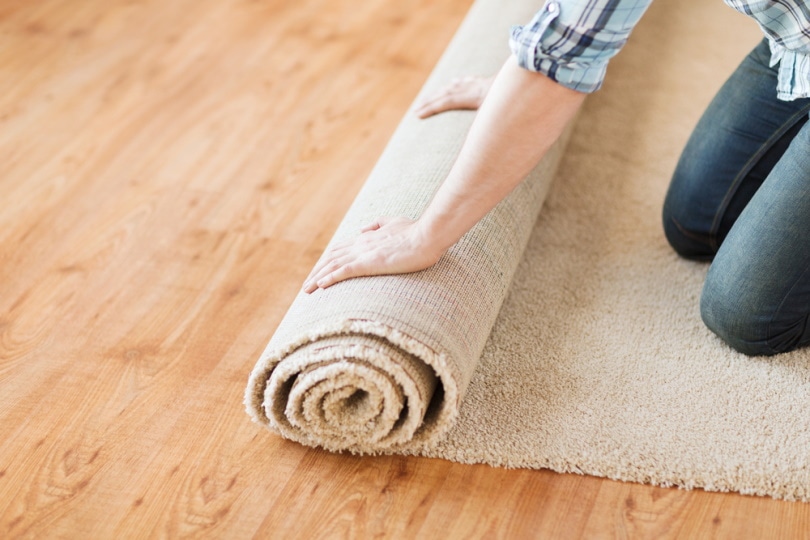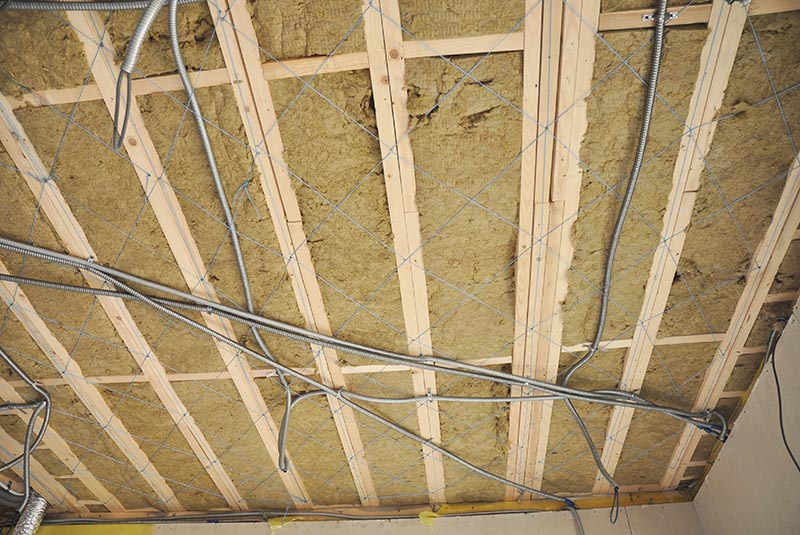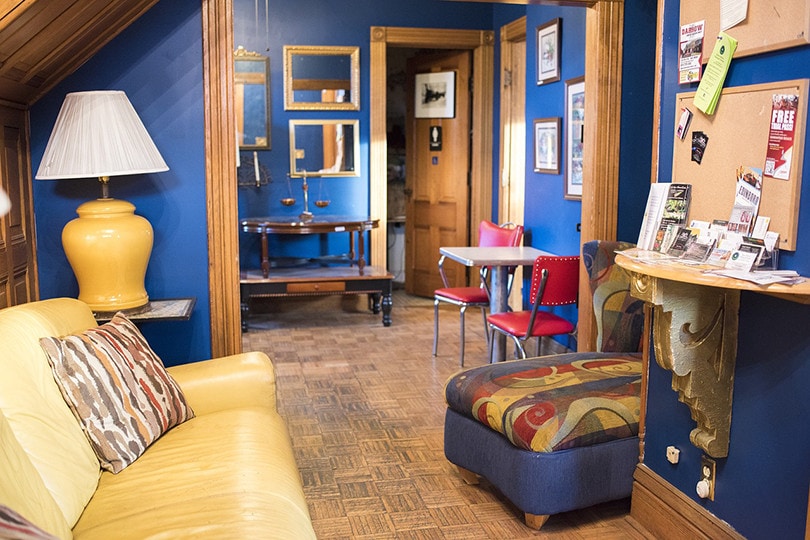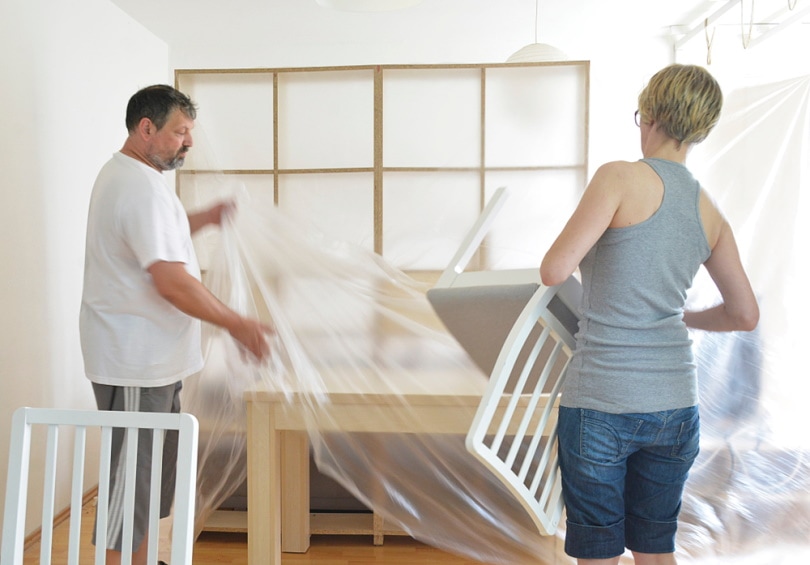How to Soundproof a Basement: 15 Tips & Tricks
-
Brooke Bundy
- Last updated:

Whether you’re thinking about converting your basement into an Airbnb—or you’re a frustrated tenant in a basement apartment—soundproofing your basement is a courteous way to share your home with multiple households, or extra-loud members of your own family. If you’re building your basement from scratch or doing an extensive remodel, you’ll have more effective options, but there are plenty of temporary measures to soundproof your space for cheap.
We’ve broken the list into the top tips depending on your type of basement. Click on the link that match your type of basement to review it:
How to Soundproof a House Basement
The most effective way to cancel noise in your basement is to plan ahead while you’re building or renovating your house. Creaky boards and heavy footsteps upstairs often reverberate to the basement ceiling, which is annoying for anyone on that level. Conversely, if your teenager is blaring music in the basement, you’ll probably hear it if your living space is directly above them on the first floor. With this foreknowledge, try to tackle the problem from the inside out.
1. Identify the Source
What’s making the noise? Is it a train horn blaring from the rambling railroad tracks a quarter mile away? Is it children stomping on the floor as they flood into the kitchen after school? Find out if the noise is coming from outside or upstairs. Alternatively, if you’re the one making the noise, you’ll need to find a way to prevent your sound from traveling upstairs and disturbing people on the first floor.
2. Choose Carpet

Hard flooring gives the sound a harsh point of contact that’ll typically reflect most of the soundwaves instead of absorbing them. Pick carpet over tile during your next renovation if soundproofing your basement is a top priority.
3. Lay Down a Carpet Pad
Place a thick carpet pad between the floor and the carpet itself. This will help absorb extra sound waves.
4. Insulate the Ceiling

Most basements have tile ceilings that can easily be removed. Stuffing the space with insulation or even cotton batting will muffle some of the sounds coming from upstairs—and prevent your noise from traveling to the first floor.
5. Insulate the Walls
We highly suggest insulating the walls if you have the opportunity. Unfortunately, you can only do this if the basement is still being built or is undergoing renovation.
6. Rearrange the Upstairs Furniture

If you’re in charge of the upstairs space, be mindful of where you place furniture and rugs. Putting down carpet or area rugs in heavily trafficked areas can reduce the noise level downstairs. Avoid putting clattering furniture such as China cabinets directly above the basement living space. Opt for absorbing fabric furniture in those areas if possible.
How to Soundproof a Basement for Renters or Homeowners on a Budget
All of the ideas listed above are great if you own the property or if you have a little more money to spend. However, maybe you just moved into your new place without pennies to spare, or you don’t want to invest in a temporary dwelling. No problem. Here are some simple ways you can block out your neighbor’s weekly tailgate parties in a flash.
7. Buy Densely Woven Rugs
If carpeting isn’t an option, you can buy a large area rug to cover most of the space. You can even add carpet padding under the rug for extra absorption.
8. Hang Acoustic Panels on the Walls

Used by musicians in the studio, acoustic panels soak up the soundwaves, and they look good, too. Some even have designs on them if you don’t like the neutral aesthetic.
9. Opt for Acoustic Foam
Alternatively, you can hang acoustic foam on your wall if you don’t prefer acoustic panels.
10. Rearrange Your Furniture

Place heavy furniture along the walls where the noise is coming from. Large wooden bookcases are excellent sound blockers if the disturbance is drifting through the walls rather than through the ceiling.
11. Fix It with Fabric
Curtains, pillows, and upholstered furniture will all absorb the sound coming from the inside and out. You can also buy curtains with extra absorbency that were created for the task like these.
12. Use Blankets

This might not be the prettiest method, but it works. You can hang blankets or towels along your walls or ceiling with tough tacks. If you don’t have rugs or carpet, you could also lay blankets or towels on the floor to absorb the noise. Take time to identify the source of the sound so you can make sure it’s covered.
Alternative Methods
If you can’t renovate your space and prefer not to clutter your area with blankets, towels, and soundproofing curtains, we hear you. Or maybe there are contractors unexpectedly hammering on your neighbor’s roof, and you need a quick solution for your workday. Although these aren’t exactly “soundproofing” methods, they’ll help mask the noise while you get things done.
13. Play Some Music
If you’re not in the mood for tunes, the internet has ambient sound playlists to make you feel like you’re in a different place.
14. Turn on a Fan or Heater

Space heaters or fans often make a lot of noise, which is good if you’re needing to block sound and even better if the temperature is a little too hot or cold. Running the vent fan on the microwave will likely do the trick if you don’t need the extra temperature control.
15. Wear Headphones
Whether or not you actually play music is up to you. Headphones by themselves will cancel out some of the noise, but you won’t hear your neighbors at all if you’re playing your jams.
Conclusion
Soundproofing your basement allows the parties on both floors to live together in peace. Whether you’re the one raising the ruckus, or the person who needs their quiet space, taking measures to make sure the sound doesn’t travel from one floor to the next keeps everyone happy. Permanent solutions such as carpeting the floor and insulating the walls and ceilings are the best methods for soundproofing your basement.
However, there are many temporary options such as area rugs if you don’t have the time or money to solve the issue. If you need a quick solution, you can play some music or run a fan to cancel out the distracting sound. You might still hear some noise regardless of the method, but it doesn’t have to be disruptive and loud, especially if you combine a few techniques.
Featured Image Credit: adam-winger, Unsplash
Contents
